Key takeaways:
- Ethical dilemmas in fashion require balancing personal values with the realities of production practices, often leading to deeper engagement with brands.
- Consumer choices in fashion reflect broader social values, stressing the importance of ethics over mere aesthetics and highlighting the impact on future generations.
- Key criteria for ethical jeans brands include transparent supply chains, sustainable materials, and community contributions, fostering a mindful shopping experience.
- Personal values in fashion, such as authenticity, sustainability, and inclusivity, shape decisions, encouraging a focus on responsible consumption and the stories behind products.
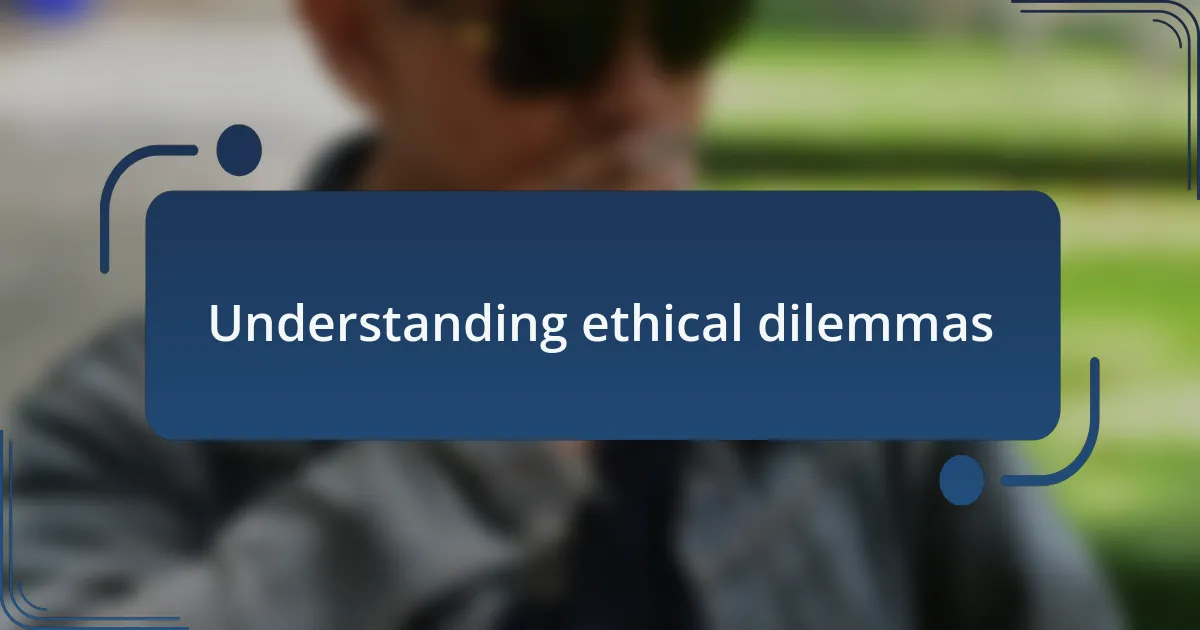
Understanding ethical dilemmas
Navigating ethical dilemmas can often feel like walking a tightrope, balancing personal values against conflicting choices. I remember a time when I had to decide whether to support a jeans brand that boasted eco-friendly practices, only to discover they had questionable labor practices. How do we reconcile our desire for sustainable fashion with the reality of the workforce behind it?
It’s crucial to recognize that not all ethical dilemmas have clear-cut answers. I’ve found myself often asking, “What impact does my choice have on the larger community?” This question has driven me to dig deeper into the practices of brands I support. It’s not just about the jeans themselves; it’s about the story behind them and the values they represent.
We all want to make mindful choices, but ethical dilemmas can muddy the waters. Have you ever faced a choice where your values didn’t align with your options? Personally, this realization has pushed me to engage more actively with brands, seeking transparency, and advocating for a conscience that aligns with the products I choose to wear. It’s a journey that’s far from simple but is ultimately rewarding.
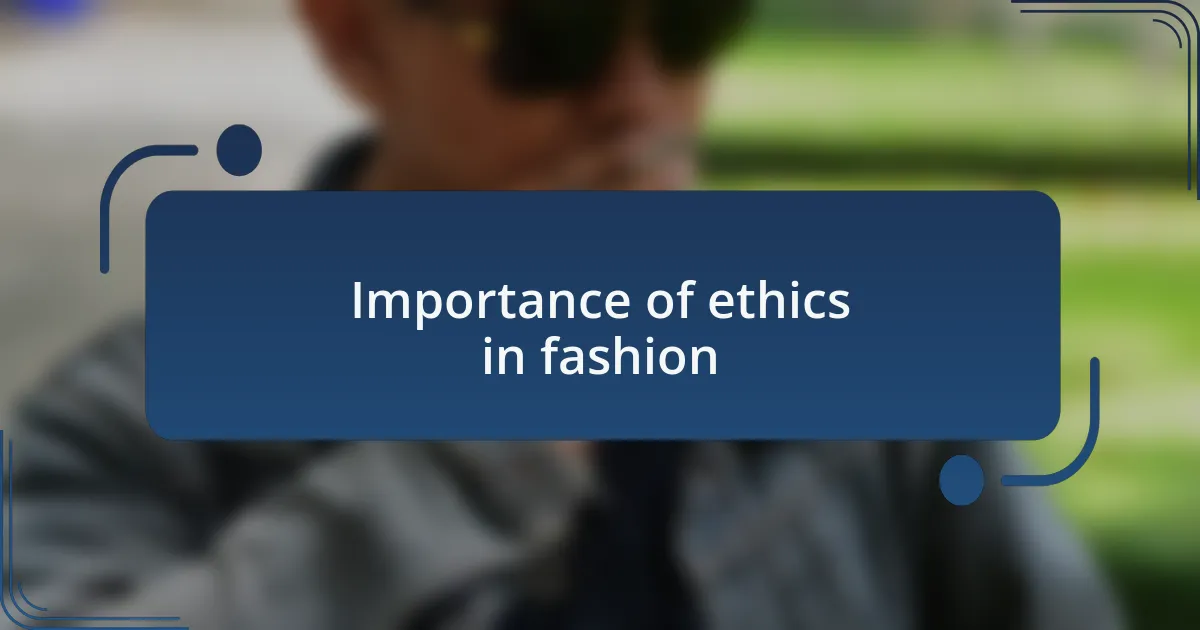
Importance of ethics in fashion
Fashion is more than just clothing; it’s a reflection of our values and ethics. I recall a moment when I stumbled across a jeans brand with a stunning design but learned that they exploited workers in developing countries. How could I justify wearing something beautiful if its creation came at such a high human cost? This experience emphasized for me that our purchasing decisions extend beyond aesthetics; they resonate with the broader implications of social justice.
When I think about the importance of ethics in fashion, I realize it impacts not just the present but future generations too. Imagine a world where every brand values its artisans, ensuring fair wages and safe working conditions. I often encourage friends to consider the stories behind the seams. Each choice we make sends a message, and wouldn’t it be empowering if that message stood for fairness and compassion?
Ultimately, the fashion industry holds immense power to influence societal norms. I’ve participated in conversations about this, where some friends argue that ethics are secondary to style. Yet, I can’t shake the feeling that we should demand more from the brands we love. Isn’t it time we prioritize humanity over mere trends?
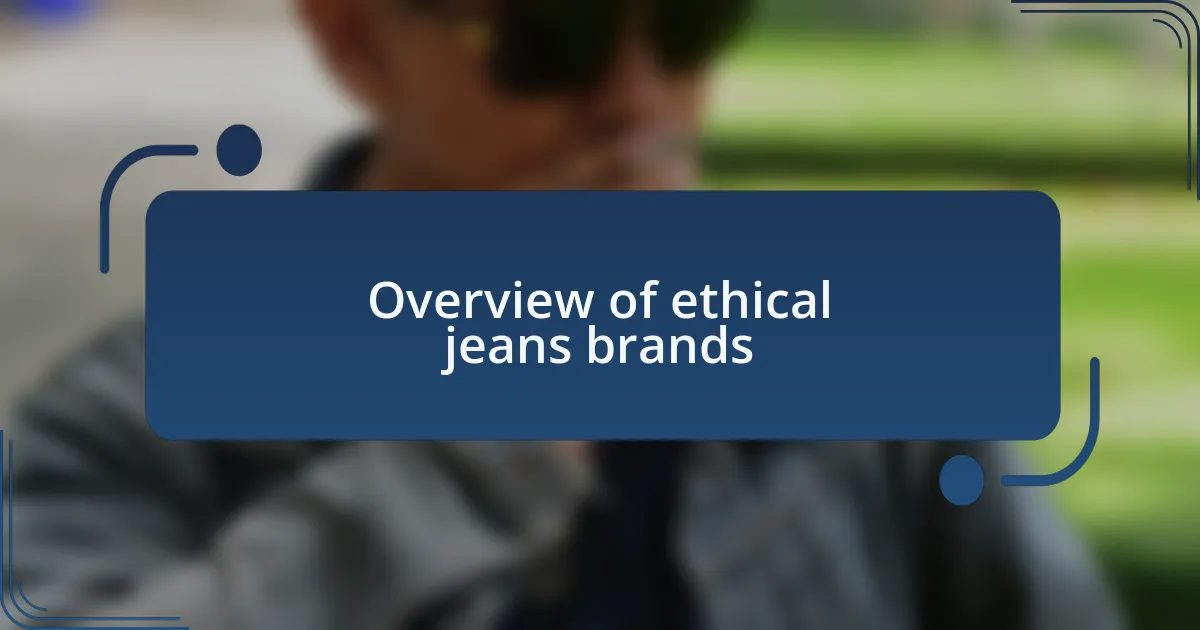
Overview of ethical jeans brands
When I think about ethical jeans brands, certain names come to mind, like Levi’s WellThread and Everlane. These companies prioritize sustainable practices, from using organic materials to reducing water consumption in production. I remember trying on a pair from one brand that not only felt good but also reflected my values, making me realize that my choices can actively support positive change.
It’s fascinating how many brands are stepping up to address environmental and social issues in their production processes. For instance, some companies partner with nonprofit organizations to provide support for garment workers, fostering community development. I once met a founder who shared her journey of transitioning to ethical production; her passion was contagious and reminded me that real change often starts with a single decision to do better.
What strikes me is how these brands challenge the traditional fashion model. They encourage consumers to think critically about the origins of their clothing, prompting questions like, “Where was this made?” and “Who benefited from my purchase?” I can’t help but feel a sense of fulfillment knowing that I’m part of a movement that uplifts both people and the planet through thoughtful choices.
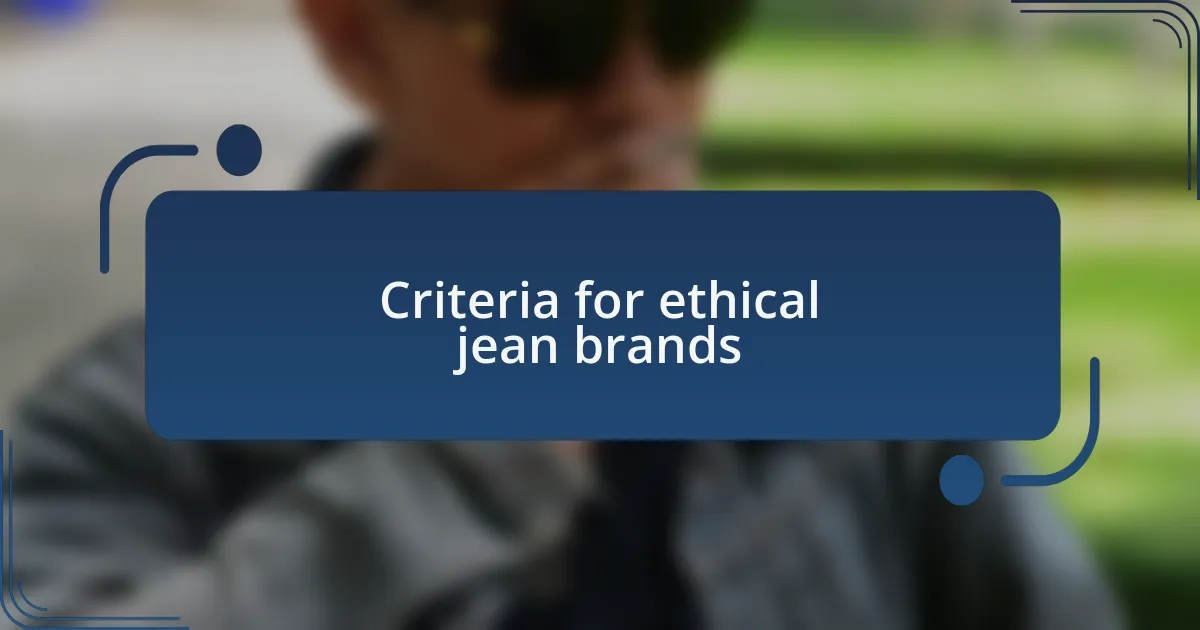
Criteria for ethical jean brands
When evaluating ethical jean brands, I focus on transparent supply chains. It’s crucial to know where the jeans are made and under what conditions. I remember discovering a brand that openly shares its suppliers and labor practices, making me trust their commitment to ethical sourcing—even allowing me to feel confident in my purchase.
Another key criterion is the use of sustainable materials. I’ve personally been moved by brands that employ organic cotton or recycled fibers, as I connect with the idea of reducing waste. Have you ever felt the assurance that comes from knowing your jeans are made from eco-friendly resources? It’s a small factor that has made a big difference for me in how I view my clothing choices.
Lastly, community impact cannot be overlooked. I appreciate brands that give back to their workers or support local initiatives. For instance, I once bought jeans from a company that donates a portion of its profits to education programs in garment-producing countries. Seeing my purchase contribute to a greater cause added meaning to my shopping experience, reminding me that every decision can ripple through communities.
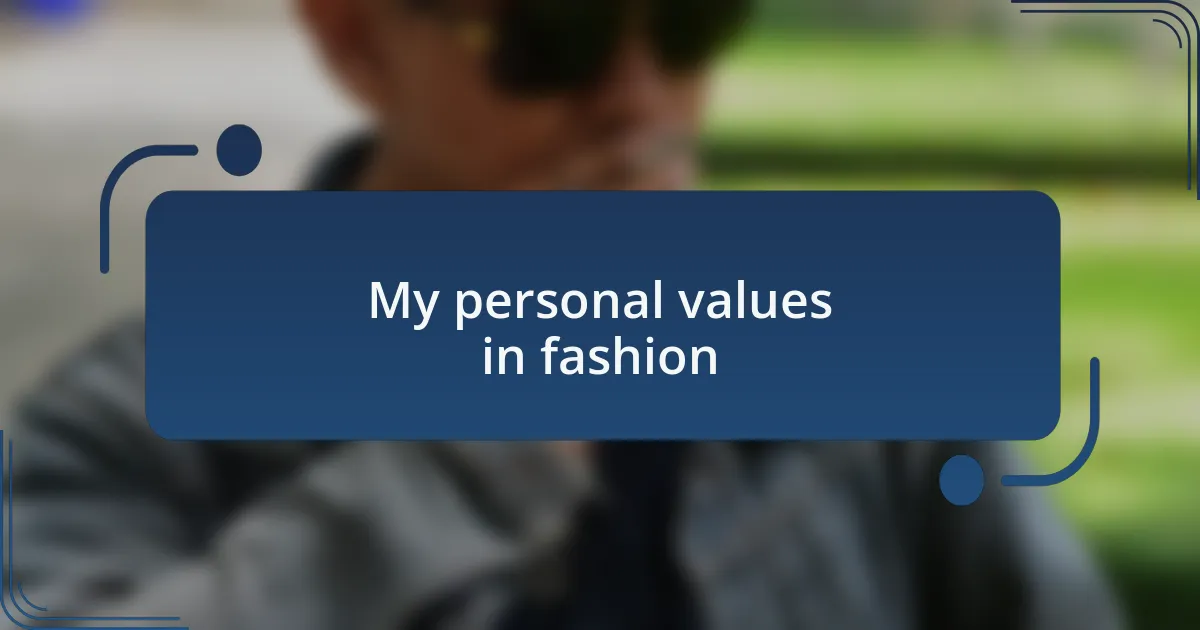
My personal values in fashion
When it comes to my values in fashion, authenticity tops the list. I often find myself gravitating towards brands that exude honesty, not just in their practices but in their messaging. I recall a time when I stumbled upon a small jean brand that shared the stories of the artisans behind each pair. It struck a chord with me, reminding me that every piece of clothing has a journey—I truly appreciate when a brand highlights the human element in its creations.
Sustainability is also close to my heart. I still remember the first time I purchased a pair made from recycled denim; it felt like investing in the future rather than just another item for my wardrobe. It made me ponder: How often do we consider the environmental cost of what we wear? That realization has shifted my perspective, making me more mindful of the choices I make in every purchase.
Lastly, I deeply value brands that promote inclusivity. I was moved by a company that features diverse body types in its marketing campaigns, challenging the traditional norms of beauty in fashion. This approach resonates with me on a personal level, reminding me that fashion should be for everyone, celebrating uniqueness rather than conforming to a singular ideal. Don’t you think it’s refreshing to see a brand embrace real people in all their forms?
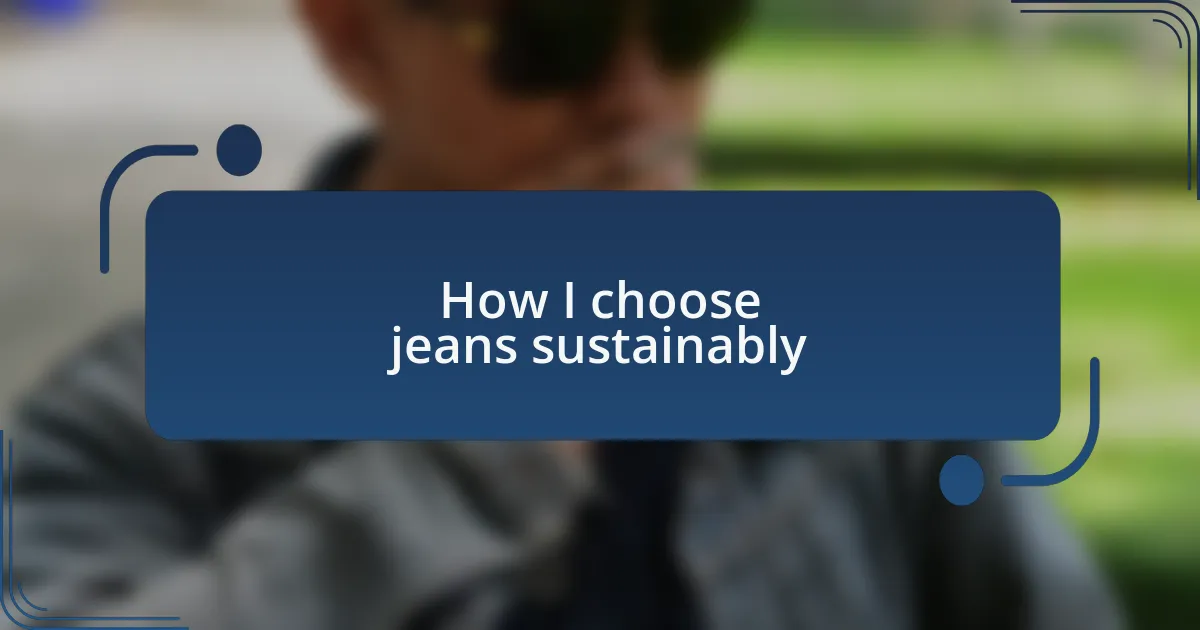
How I choose jeans sustainably
Choosing jeans sustainably has become a personal journey for me. I remember exploring a thrift store a few months ago and finding a vintage pair that instantly captured my heart. Not only did I feel good about giving pre-loved jeans a new life, but I also loved the uniqueness they brought to my wardrobe. Isn’t it amazing how much character a secondhand item can have?
When I look for new jeans, I pay close attention to the brand’s transparency regarding their manufacturing processes. I came across a company that uses organic cotton and natural dyes, which hit home for me. It made me think: why settle for anything less when there are options that prioritize our planet? Knowing that my choices can support a healthier environment drives me to seek out these brands.
Moreover, I find myself drawn to enterprises that invest in fair labor practices. I recently discovered a brand that not only shares its ethical sourcing stories but also provides resources for workers’ education. I often ask myself, how can we create a more equitable fashion industry? Supporting brands that uplift and empower communities feels like a step toward the change I wish to see. It’s about more than just jeans; it’s about responsible consumption and making a positive impact with every purchase.